The show must go on.
For a while, we thought the opening weekend of the BKT United Rugby Championship might get lost in the euphoria of Ireland's run to the World Cup final, but after the heartbreak of the quarter-final defeat to New Zealand a week ago, the return of the URC is a warm shoulder to cry on.
A new season, new kits, new players and in the case of Ulster, a new pitch at Kingspan Stadium.
It feels like a lifetime ago we saw Munster’s Thomond Park homecoming in the late May sunshine after a sensational final against the DHL Stormers in Cape Town.
For those who missed out on the play-offs, it’s been the longest off-season imaginable; almost six months to the day since their last game in anger.
The URC is the last of the major northern hemisphere leagues to return for their new campaign.
The Top14 in France managed to squeeze in three rounds of games before the World Cup even started and will resume again next week, while the Premiership opened its doors for the new year a week ago.
It’s the third year of the URC in its current guise, and this version of the competition looks like being the best we’ve seen in the 22 years since the Celtic League was born.
There are issues yet to be addressed: it's hard to see a Welsh side genuinely competing for the title in the near future given their financial issues, while the travel schedule for the South African sides puts them at a real disadvantage at times.
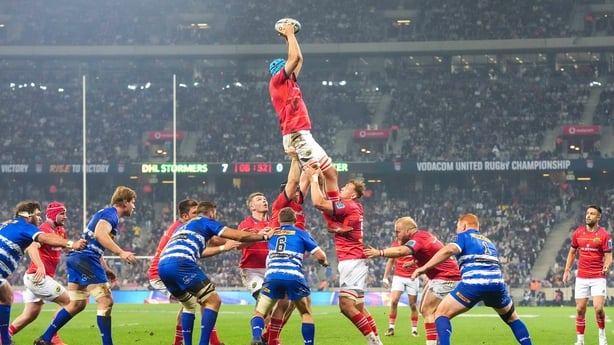
The format of the 2023/24 season is largely the same, but with a couple of minor tweaks. Like previous seasons there will still be 18 rounds of regular-season games, with the top eight sides advancing to the quarters, semis and Grand Final, which is to be hosted by the top-ranked side.
The first change will be around the qualification process for the Champions Cup. In the opening two seasons of the URC, the winners of the four regional 'Shields’ earned Champions Cup qualification, while four more spots went to the next best finishers in the full league table.
The result of that format saw Glasgow and the Sharks miss out on a place in the top-tier competition in each of the last two seasons despite reaching the play-offs, while the Ospreys and Scarlets qualified for the Champions Cup at their expense following ninth and tenth place finishes in 2022 and 2023, respectively.
Instead, organisers have simplified the process and made it more meritocratic, with the top eight sides in the league all booking their place in the Champions Cup. The only exception would be if a team who finished outside the play-off spots went on and won the Challenge Cup.
The other tweak comes to the four regional Shields. With the Shields no longer needed to decide Champions Cup qualification, their purpose has been reimagined for the 2023/24 season.
From now on, only games between the four teams in each Shield will count in these mini-leagues. In effect, they have no say on the overall championship, but are now a league within a league.
From an Irish point of view, it essentially brings the Interprovincial Championship out of hibernation. It might be a few years before it becomes a major part of the league’s narrative, but it’s an interesting tweak nonetheless.
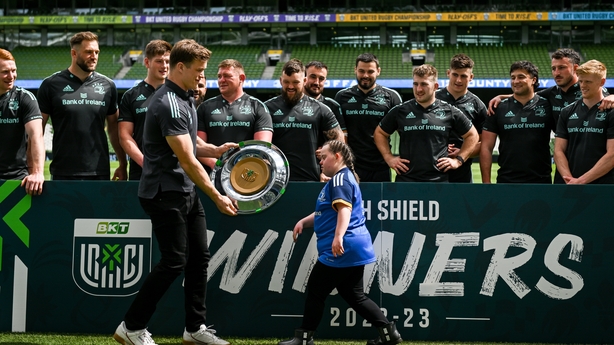
The change in Champions Cup qualification is one that on paper is designed to suit the Irish and South Africans, who have dominated the competition in its first two seasons.
The only thing that could get in the way of it would be a World Cup hangover.
With South Africa’s Webb Ellis campaign still going for two more games, it could be several weeks into the season before we see their frontline Springboks playing in the URC.
The Irish sides are expecting to welcome back their internationals in the next three to five weeks, depending on what their World Cup workload was.
URC ROUND 1: ALL YOU NEED TO KNOW
Given the painful nature of their defeat to the All Blacks, a post-World Cup hangover is a real possibility, with Leinster the obvious candidates given the sheer numbers of players they have been without.
In addition to 19 of the Irish squad, they also had prop Michael Ala’alatoa, attack coach Andrew Goodman and analyst Brian Coakley working with Samoa, while their senior coach Jacques Nienaber is still in France with the Springboks.
The reassurance from a Leinster point of view would be how they avoided such a hangover after what was a miserable 2019 World Cup for Ireland.
Leo Cullen’s side famously went on a 25-game winning run to start the 2019/20 campaign, only ended by a shock Champions Cup quarter-final defeat to Saracens after the Covid lockdown.
With the Ireland regulars set to be rested for the next few weeks, there’s also the opportunity for some of the younger talent to plant a flag. Four years ago, Caelan Doris, Rónan Kelleher and Hugo Keenan were among those to take their chances.
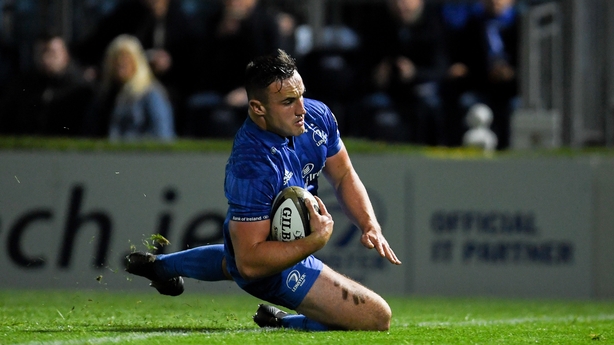
A look at their team sheet for the opening game away to Glasgow on Sunday shows several familiar names from successful Ireland Under-20 sides of recent seasons: Jack Boyle, James Culhane, Paddy McCarthy and Sam Prendergast.
Meanwhile, Harry Byrne has the first chance to lay a claim on the 10 jersey long term, following the retirement of Johnny Sexton.
Forwards coach Robin McBryde says getting to work hands-on with the next generation has been a huge part of pre-season.
"They’re vital really," he says of the time together.
"The ages that they’re currently at now, we’ve seen a massive acceleration of their growth over short period of weeks.
"They’ve got to come through, they’ve got to be banging on the door and have been encouraged to do that."
For Munster, there’s little reason to expect a hangover. While they will be without their Irish contingent for the next few weeks, as well as RG Snyman and Jean Kleyn, the long pre-season should have been welcomed by Graham Rowntree and his coaching ticket.
After last season’s horror start, they made a miraculous turnaround to go and end their 12-year trophy drought. In the final third of that season, it was clear they were growing more and more comfortable with their new training and game plan, and a longer than usual pre-season should have given them even more time to gel.
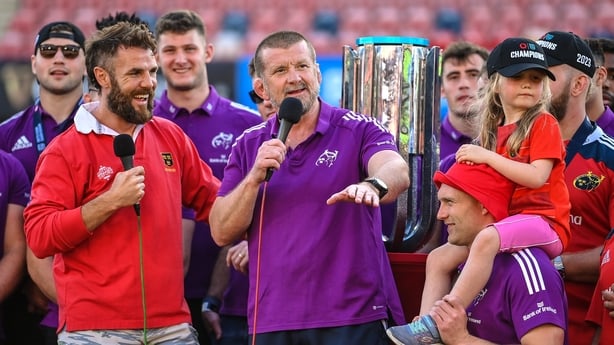
From a squad depth perspective, they look like they should be able to get through the opening weeks of the season in decent nick before the frontliners arrive back.
Andrew Conway is fit again after missing the entirety of last season, and if Calvin Nash and Shane Daly pick up where they left off in May it makes for an exciting back-three, even allowing for Mike Haley’s long-term injury.
John Ryan’s return gives them depth at tighthead, Gavin Coombes’s frustration at missing out on the World Cup should see Munster profit, while the World Cup absences will allow better exposure to the likes of Edwin Edogbo, Ethan Coughlan and Brian Gleeson, the latter of whom looks like being one of the province’s hottest prospects in years.
If they can get through their opening three games against Sharks, Benetton and Dragons in decent shape, it will set them up nicely to welcome back their bigger names as they face Ulster, Stormers and then Leinster before the start of the Champions Cup.
Speaking of Ulster, this feels like a make-or-break season for Dan McFarland’s side.
Having impressed and fallen just short of a final appearance in 2022, it looked like they were heading for bigger and better things when they started last season like a train, but they never fully recovered from a brutal run of form in mid-season, before a home-quarter final defeat to Connacht.
It’s been a summer of transition up north, with 12 players departing the senior squad.
Experienced pros like Jordi Murphy, Craig Gilroy, Sam Carter, Ian Madigan and Duane Vermeulen are among those who left, putting more responsibility on the likes of Nick Timoney, Mike Lowry, James Hume, Rob Baloucoune and even youngsters like Tom Stewart and Nathan Doak to fill that leadership void.
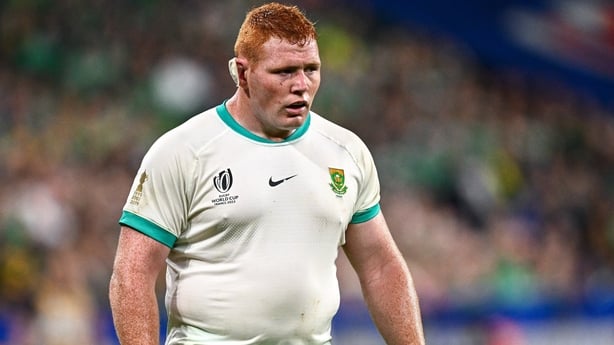
McFarland’s sides have always packed a punch up front, and while they will have a formidable group of tight-five forwards later on in the campaign when Steven Kitshoff, Tom O’Toole, Rob Herring and Iain Henderson get back from World Cup duty - and Marty Moore returns to full fitness – they do look light in that department for the first few weeks.
If Ulster can lay on good ball to their backline, they know they have the talent outside to execute, and the installation of a new artificial surface at Kingspan Stadium has been designed to allow them play to their strengths.
It’s a gamble Connacht took last season, but one that paid off, and the western province come into the new season off the back of a brilliant campaign which saw them secure Champions Cup qualification.
While there’s been plenty of change, it’s change that they’ve been planning for for some time. With Andy Friend departing, Pete Wilkins has stepped up to the coaching role, while the arrival of second row Joe Joyce has been confirmed for more than a year.
They’ll have to make do without Finlay Bealham, Bundee Aki and Mack Hansen early on, but that’s always been a hurdle for them to navigate, and it’s not so long ago that Aki couldn’t get into their squad.
If the signings click for Connacht, they could be a sensational team to watch. Andrew Smith (below) and Liam McNamara come in from the Irish Sevens programme, while JJ Hanrahan brings greater depth to out-half, to compliment Jack Carty and David Hawkshaw.
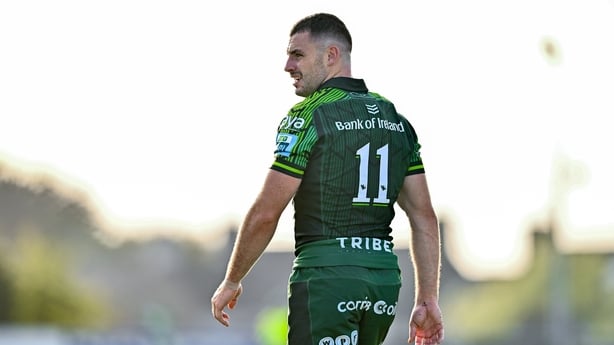
Young prospects like Cathal Forde, Dylan Tierney-Martin, Cian Prendergast and Niall Murray are another year older, while flanker Shamus Hurley-Langton will be hoping to start this season like he finished the last.
The key for Wilkins in this campaign will be what it always is for Connacht: consistency.
They started last season with three defeats from three, and all of those were away from home after delays to their new surface at the Sportsground, but were vindicated after an excellent finish saw them reach the semi-finals.
There’s a degree of pressure on them now though. The Champions Cup will bring with it greater demands on their squad, while the qualification process for Europe next season plays right into their hands.
In addition, they start this season with three consecutive home games against Ospreys, Glasgow and Ulster. If they can use that as a springboard for the season, who knows where it could end.
If not, June will seem like a long way away.
Listen to the RTÉ Rugby podcast on Apple Podcasts, Spotify or wherever you get your podcasts.
Watch Argentina v New Zealand in the Rugby World Cup semi-finals on Friday from 7.35pm on RTÉ2 and RTÉ Player, follow a live blog on RTE.ie/Sport or the RTÉ News app


